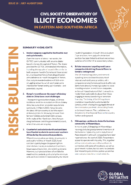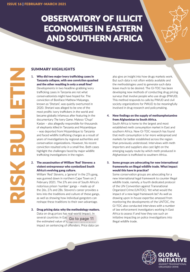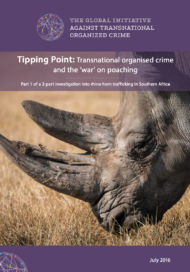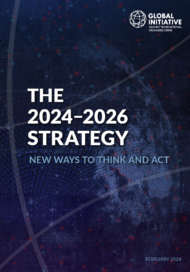Posted on 03 Jun 2020
The coronavirus outbreak shows that oversights in ground-level approaches to combating wildlife crime in southern Africa come at a great price. While the effects of the pandemic can be plotted only anecdotally thus far, a series of clear red flags emerge.
Potential links between the coronavirus and the consumption of wildlife products have drawn new attention to the illegal wildlife trade. Much of that has centred on trade in the global context, with a specific focus on demand hubs in China and other Asian countries.
This focus is appropriate, justified and urgent. Yet it is also crucial to monitor, take stock of and plot the effects of the pandemic on the supply side of the spectrum – particularly across southern Africa, where animal products are sourced through highly organized poaching as well as more informal, low-level crimes, such as the snaring of animals for bushmeat.
While policymakers have been forced to act with immediacy to deal with the realities of COVID-19, it is crucial also to acknowledge, and learn from, a clear set of emerging lessons that reflect on the shortcomings and successes of efforts to combat wildlife crime thus far.
The immediate aftermath of the COVID-19 pandemic has seen a spike in low-level bushmeat poaching across southern Africa. For conservationists and law-enforcement actors, this adds urgency to calls for sufficient recognition of the environmental, health and security risks associated with the poaching, trade and consumption of bushmeat.
There has been a tendency – both among national-level, criminal-justice actors and the broader donor community – to focus overwhelmingly on the poaching of iconic species such as rhino and elephant. While crimes involving these large (and endangered, in the case of rhino) species warrant urgent action, the spotlight should be broadened to include the hundreds of other species that are routinely killed, captured, trafficked and consumed, whether locally as bushmeat, or destined for international markets. In terms of the latter, many of these species pose a significant and constant risk for the emergence and spread of new zoonotic diseases. (It should also be noted that this risk is not limited only to the illicit trade, but also occurs in the legal animal and wildlife trade.)
‘The wildlife-trafficking issue has not encompassed human safety in the past, at least not in the public discussion. But from a law-enforcement perspective, it has always encompassed human safety,’ says Ed Newcomer, US Fish and Wildlife Law Enforcement Attaché for Southern Africa. ‘Bird smuggling, for instance, is a huge risk – way riskier than COVID-19. Right now, bird flu does not easily transmit to humans, but it would just take one slight mutation. We’re seeing that COVID has about a 3–5% death rate. For bird flu, the lowest number I’ve seen is 30%. People smuggle birds all the time, and they do it on commercial aeroplanes in the passenger compartment.’
Although many of the smaller species targeted are not currently endangered, the deleterious impacts will reach a tipping point in time, as has been the case elsewhere. ‘They [bushmeat poaching and more organized poaching] deserve equal attention, because very slowly, Africans are going to see common plains game species disappearing before their eyes, or becoming depleted to the point where you just won’t see them anymore, except in the national parks. In America, we did see this exact thing happen. What the US ended up doing was to adopt an extremely robust licensing and permit system,’ says Newcomer.
Policymakers and law-enforcement agencies should acknowledge that, ultimately, the same behaviours and drivers that enable and fuel bushmeat poaching can also bring ecological and health risks. Large-scale bushmeat poaching can cause irrevocable damage to eco-systems, and, as people encroach on wildlife habitats, there is an increased risk of exposure to new pathogens.
Crafting better responses requires a more comprehensive understanding of not only the push factors that can cause communities to engage in wildlife crime, but also greater acknowledgement of the difficulty in defining criminality in contexts where informal, cross-border economies are a part of daily life.
Protected areas are typically those geographies that were historically the least attractive for people to inhabit, whether due to natural diseases, such as malaria, or by virtue of their sheer remoteness from more established urban centres. This poses a unique and complex set of criminal-justice implications, as the people who live alongside protected areas are typically poor, and experience extreme governance, service-delivery and developmental deficits.
That these protected areas and neighbouring communities are often intersected by national borders adds another challenge, particularly for law-enforcement efforts. Though not licit, the cross-border trade of goods such as petrol, charcoal, flour and sugar is an entrenched practice and central to the livelihoods of many. Within this context, illicitly obtained wildlife products are, in a sense, just another commodity.
The pandemic has led to trade restrictions, which means that people are unable to sell key seasonal crops, like tobacco and cotton in Zambia. As financial pressures mount, illicit markets, including the trade of animal products, may also become more attractive to traders. ‘Poaching for bushmeat is the single biggest threat to our national parks and the ecological integrity of our national parks. It will increase because the population [in Zambia and Malawi] is starved of funding opportunity: they can’t sell the tobacco and they can’t sell their cotton. So they will be relying more on bushmeat,’ says Mike Labuschagne, the International Fund for Animal Welfare’s Director of Law Enforcement, Southern Africa.
Communities will also be affected by what happens in urban centres. As COVID-19 results in employment breaks or losses in cities, remittances and other income streams in rural communities will dry up, increasing food insecurity and potentially fuelling ‘poaching for the pot’ – or subsistence poaching.
COVID-19 has also highlighted the urgent need for wildlife economies to be diversified beyond tourism, as the impact of global travel bans are being felt not only by national departments of wildlife and private-sector operators, but also, crucially, the communities who derive financial benefits from the tourism industry, whether through lease agreements of their land or direct employment in the sector. ‘There’s no doubt that those communities are poorer now than they were three months ago. Communities who were relying on or expecting lease money to be paid to them, which is often based on turnover of those lodges, are now going to lose that in the forthcoming year. A lot of that money would have been used for community development,’ says Steve Collins, CEO of the African Safari Foundation.
In the long term, these pressures are only likely to increase, as competing demands may constrain donor funding, and already limited government resources are redirected to more pressing matters aimed at mitigating the impact of COVID-19.
These pressures will no doubt result in a renewed call, especially from southern African states, for the international ban on ivory and rhino horn to be loosened so that revenues may be generated from the sale of government stockpiles.
In Zimbabwe, solar panels that are meant to pump water for wildlife have been stolen since the outbreak of the pandemic, and here too, tourism is now non-existent. ‘We are doing our best in fighting wildlife crime, but we need the resources, we need more money, so that at least we can look after our animals. The animals need water, and now we are approaching the dry season. That is why we say we should be allowed to trade [ivory and rhino horn]. We’re sitting on 110 tonnes of ivory, and almost 10 tonnes of rhino horn,’ said Tinashe Farawo, Zimbabwe Parks and Wildlife Management Public Relations Manager.
While it is imperative that countries and communities should derive benefits from their natural resources and exercise their sovereign right in how they choose to do so, such proposals, and various others advocating for increased sustainable use, must be accompanied by an equally vociferous call for robust regulatory and oversight frameworks. Without sufficient frameworks and, crucially, enforcement in place, new channels will only create additional systems for the illicit market to thrive off.
As employment cuts loom in the wake of COVID-19’s economic impact, the job security (and job satisfaction) of patrol scouts and game rangers will also become a key issue. In many countries across Africa, state-employed game rangers struggle to have their basic conditions of employment met through, for instance the provision of uniforms and equipment – let alone receive sufficient recognition and remuneration for a job that is often gruelling and dangerous. It isn’t hard to see how a disgruntled and desperate ranger with expert knowledge may become an easy recruit into organized wildlife crime. ‘Every country has problems with official corruption among enforcement agencies. The real question is not whether or not you have corruption, it’s how you deal with it. If you aggressively respond to it, and you’re not afraid to talk about it, and you give the people who are doing the enforcement work a living wage and pride in their job, you’ll be able to keep it in check,’ says Newcomer.
Along with diversified wildlife economies, sincere and carefully considered community-beneficiation initiatives, and a focus on remedying historical marginalization, combating wildlife crime crucially calls for a strengthened criminal-justice response, both nationally and across borders, from arrest through to prosecution. In many places, this response is deeply fragile and insufficient, and can ill afford being ground to a halt by COVID-19. Yet this is currently the case, as law-enforcement resources are restricted or diverted elsewhere, and legal proceedings are put on hold.
There is little consensus on whether poaching has risen, abated or remained consistent amid the pandemic, and trends are expected to be context specific. Similarly, traffickers and low-level traders may be stockpiling illicit wildlife products until they can be moved again; or they may see this as too great a liability. ‘It’s super risky right now to move contraband. The bad guys who would normally be transporting it don’t want to risk getting stopped at a military or police checkpoint, and having awkward questions asked and then their vehicles searched,’ explains Newcomer.
What is more certain is the likelihood that ports will increasingly be used to move contraband, as movement by air is restricted. ‘Either there’s going to be stockpiling, because you can’t fly it out, or there’s going to be a greater reliance on ports. While rhino horn would [before COVID-19] be more likely to leave on aircraft simply because of the price it fetches on the other side, ivory has generally been shipped. And, as far as I know, shipping hasn’t been affected,’ says Labuschagne.
It is not yet possible to know how COVID-19 will shape and drive wildlife crime in the long term. Yet policymakers, criminal-justice actors and the donor community should use this moment to recognize not only how historical oversights are now exacerbating the negative effects of pandemic – but also offering critical guidance for how efforts to combat wildlife crime must urgently be improved.
Unlike narcotics, arms or other illicit commodities, animal populations cannot indefinitely absorb the impact of the illicit wildlife trade, and the threat of extinction for a vast number of species is very real, and very urgent. Unlike other forms of organized crime, the illicit wildlife trade is uniquely time bound. Much of the harm is done at the start when the animal is killed or removed from its habitat. While downstream supply-chain interventions might help to stop trafficking, they cannot reverse the chronic impact on environmental sustainability. Beyond the threat of species extinction, the coronavirus pandemic has also shown us that the true stakes of wildlife crime include human health and security. COVID-19 requires attention and resources efforts, but a pause in efforts to combat wildlife crime will, much like the pandemic itself, come at an unthinkable cost in the long run.



